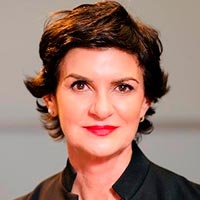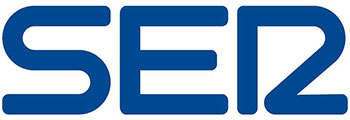Master´s Degree in Journalism in Television

With a faculty made up of professionals of recognized prestige
In this master's degree, we prepare versatile journalists to produce audiovisual news on all digital platforms.
The classes are 100% practical, and we faithfully replicate the current work routines of newsrooms in the main Spanish television channels. In our methodology we combine the passion for innovation with new narratives and the deep respect for the tradition of the journalistic profession. Our professors and teachers are journalists with extensive professional experience and accredited doctors in communication.
Passion and rigor are the two engines that have moved us for more than 10 years to continue training the new generations of television journalists in Spain.
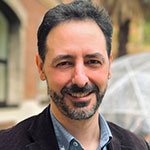 Luis Alonso Martín Romo Director of the Master's Degree in Television Journalism
Luis Alonso Martín Romo Director of the Master's Degree in Television JournalismLaila Jiménez, presenter of Informativos TELECINCO, tells us about the Master's Degree in Journalism in Television, a program made to train versatile journalists who will produce audiovisual news on all digital platforms.
Practical training from the first day
Curriculum
BOE No. 184, of August 2, 2011
All our degrees and curricula have been prepared in accordance with the new guidelines set by current legislation, having already been verified by the National Agency for Quality Assessment.
The student must take 60 credits
First Semester 28 ECTS
From October to January, both inclusive- 2 ECTS | Audiovisual language
- 4 ECTS | Production, direction and edition of information programs
- 4 ECTS | Advanced camera management workshop
- 4 ECTS | Advanced digital editing and staging workshop
- 4 ECTS | Informative workshop: Political news
- 3 ECTS | Informative technologies workshop
- 4 ECTS | Presentation and Speech
- 3 ECTS |
- Audiovisual Narrative (Elective)
- Practical applications to freedom of information (Elective)
Second Semester 32 ECTS
From February to June, both inclusive- 3 ECTS | Sports journalism
- 3 ECTS | International journalism
- 3 ECTS | Economic journalism
- 2 ECTS | Scientific, health and environmental journalism
- 2 ECTS | Fashion and society journalism
- 4 ECTS | Documentary and feature workshop
- 3 ECTS | Special programs: Broadcast of major events
- 4 ECTS |
- Internships in television information companies(Compulsory subject for professional guidance)
- Research Methodology in Communication Sciences (Compulsory subject for academic guidance)
- 8 ECTS | Final Research Project of Master’s degree
More info about the subjects
Professors
| Profesores Professors | Porcentaje de Doctores Percentage of PhD holders |
| 18 | 55,6% |
 Luis Alonso Martín-Romo
Director del Máster en Periodismo en TV y Profesor de Narrativa audiovisual
Head of the Master's Degree and Professor of Audiovisual Narrative
Doctor en Ciencias de la Información por la Universidad Complutense de Madrid. Acreditado por ANECA. Licenciado en Filología por la misma universidad. Master Executive MBA por IEde y Máster de Radio Nacional de España.
Ha trabajado en diferentes emisoras de radio y televisión y ha sido responsable de producción de doblaje y revisión de guiones para plataformas internacionales de TV.
Es profesor Universitario a tiempo completo desde el año 2006. Cuenta con una amplia trayectoria en la gestión universitaria. Durante los últimos 17 años ha impartido asignaturas del ámbito de la creatividad y los medios audiovisuales en los grados de Periodismo, Publicidad y Comunicación Audiovisual.
Es miembro del claustro permanente de la Universidad Nebrija desde 2021 y profesor de la Facultad de Comunicación y Artes, además de director del Máster en Periodismo en Televisión de esta misma Universidad.
Cuenta con varias publicaciones relacionadas con la literatura y los medios de comunicación, las nuevas tecnologías y su influencia en la difusión de las Humanidades, el fomento del espíritu crítico en los estudiantes, análisis sobre procesos de desinformación en conflictos bélicos, además de metodologías de educación superior y los procesos creativos.
Ha sido profesor visitante en la Universidad de Bérgamo (Italia).
Luis Alonso Martín-Romo
Director del Máster en Periodismo en TV y Profesor de Narrativa audiovisual
Head of the Master's Degree and Professor of Audiovisual Narrative
Doctor en Ciencias de la Información por la Universidad Complutense de Madrid. Acreditado por ANECA. Licenciado en Filología por la misma universidad. Master Executive MBA por IEde y Máster de Radio Nacional de España.
Ha trabajado en diferentes emisoras de radio y televisión y ha sido responsable de producción de doblaje y revisión de guiones para plataformas internacionales de TV.
Es profesor Universitario a tiempo completo desde el año 2006. Cuenta con una amplia trayectoria en la gestión universitaria. Durante los últimos 17 años ha impartido asignaturas del ámbito de la creatividad y los medios audiovisuales en los grados de Periodismo, Publicidad y Comunicación Audiovisual.
Es miembro del claustro permanente de la Universidad Nebrija desde 2021 y profesor de la Facultad de Comunicación y Artes, además de director del Máster en Periodismo en Televisión de esta misma Universidad.
Cuenta con varias publicaciones relacionadas con la literatura y los medios de comunicación, las nuevas tecnologías y su influencia en la difusión de las Humanidades, el fomento del espíritu crítico en los estudiantes, análisis sobre procesos de desinformación en conflictos bélicos, además de metodologías de educación superior y los procesos creativos.
Ha sido profesor visitante en la Universidad de Bérgamo (Italia).
 María Gil Rodríguez
Profesora de Periodismo de moda y sociedad
Professor of Fashion and Society Journalism
Licenciada en Ciencias de la Información, rama Periodismo, por la Universidad Complutense de Madrid. Experiencia de más de 15 años como redactora, reportera y guionista de televisión. Ha trabajado para Telemadrid, Televisión Española, Canal Sur, Antena3 y Cosmopolitan Televisión en las áreas de Informativos, debates, programas culturales, de sucesos y de moda. Especializada en información cultural, ha cubierto durante años festivales de cine y música, premios Goya, la Madrid Fashion Week, estrenos teatrales y cinematográficos, novedades editoriales, etc. Tanto en Informativos como en calidad de reportera de Madrid Directo ha elaborado también información de sociedad y sucesos en todos sus formatos: piezas informativas, reportajes en profundidad, conexiones en directo, participación en plató… Como guionista, productora y redactora, se ha ocupado de toda la producción propia del Canal Cosmopolitan Tv, desde los programas de moda hasta los de estilo de vida y cultura. Actualmente es la directora de Comunicación de la Universidad Nebrija
María Gil Rodríguez
Profesora de Periodismo de moda y sociedad
Professor of Fashion and Society Journalism
Licenciada en Ciencias de la Información, rama Periodismo, por la Universidad Complutense de Madrid. Experiencia de más de 15 años como redactora, reportera y guionista de televisión. Ha trabajado para Telemadrid, Televisión Española, Canal Sur, Antena3 y Cosmopolitan Televisión en las áreas de Informativos, debates, programas culturales, de sucesos y de moda. Especializada en información cultural, ha cubierto durante años festivales de cine y música, premios Goya, la Madrid Fashion Week, estrenos teatrales y cinematográficos, novedades editoriales, etc. Tanto en Informativos como en calidad de reportera de Madrid Directo ha elaborado también información de sociedad y sucesos en todos sus formatos: piezas informativas, reportajes en profundidad, conexiones en directo, participación en plató… Como guionista, productora y redactora, se ha ocupado de toda la producción propia del Canal Cosmopolitan Tv, desde los programas de moda hasta los de estilo de vida y cultura. Actualmente es la directora de Comunicación de la Universidad Nebrija
 Paz Gómez Martín
Profesora de Periodismo científico, de salud y medio ambiente
Scientific, health and environmental journalism professor
Doctora en Salud Pública por la Universidad de Murcia (UMU) y licenciada en Periodismo por la Universidad Antonio de Nebrija. Periodista especializada en ciencia y salud durante 17 años en La Verdad (Vocento). Ha dirigido y presentado programas sobre salud en laverdadtv y ha colaborado con las revistas nacionales Salud Revista.es y XLSemanal y con cadenas de televisión como 7RM. Ha sido galardonada con cuatro premios periodísticos, entre los que destaca el Premio Nacional Novo Nordisk Media Prize 2010 y el Premio Asebio/Genoma España de Comunicación y Divulgación de la Biotecnología 2011. Actualmente colabora con la agencia de noticias científicas SINC e imparte Periodismo sobre Ciencia y Tecnología en la UMU y en el Máster en Periodismo en Televisión de la Universidad Nebrija.
Paz Gómez Martín
Profesora de Periodismo científico, de salud y medio ambiente
Scientific, health and environmental journalism professor
Doctora en Salud Pública por la Universidad de Murcia (UMU) y licenciada en Periodismo por la Universidad Antonio de Nebrija. Periodista especializada en ciencia y salud durante 17 años en La Verdad (Vocento). Ha dirigido y presentado programas sobre salud en laverdadtv y ha colaborado con las revistas nacionales Salud Revista.es y XLSemanal y con cadenas de televisión como 7RM. Ha sido galardonada con cuatro premios periodísticos, entre los que destaca el Premio Nacional Novo Nordisk Media Prize 2010 y el Premio Asebio/Genoma España de Comunicación y Divulgación de la Biotecnología 2011. Actualmente colabora con la agencia de noticias científicas SINC e imparte Periodismo sobre Ciencia y Tecnología en la UMU y en el Máster en Periodismo en Televisión de la Universidad Nebrija.
 Marta González Caballero
Profesora Tutora académica de Prácticas en empresas informativas en televisión
Academic Tutor Professor of Practices in news companies on television
Doctora en Comunicación Audiovisual por la UCM. Acreditada por ANECA y Licenciada en Ciencias de la Información por la misma Universidad. Diplomada en el CAP por la Facultad de Ciencias de la Educación, con especialización en Didáctica de los medios audiovisuales. Profesora Universitaria desde 1998, ha realizado su labor docente en universidades públicas y privadas y en la Escuela de Cinematografía y del Audiovisual de la Comunidad de Madrid (ECAM). Ha trabajado como operadora de cámara en el Congreso de los Diputados y en los Servicios informativos de TVE. Ha desarrollado gran parte de su experiencia profesional en el ámbito de la producción audiovisual para “M&m Producciones”, realizando piezas publicitarias, videoclips y proyectos multimedia. Desde hace dos años, colabora con el Estudio de diseño Dynarange como Audiovisual Manager en Organización de eventos. Ha realizado colaboraciones para Editorial Scriptum y para JC Libros de cine.
Marta González Caballero
Profesora Tutora académica de Prácticas en empresas informativas en televisión
Academic Tutor Professor of Practices in news companies on television
Doctora en Comunicación Audiovisual por la UCM. Acreditada por ANECA y Licenciada en Ciencias de la Información por la misma Universidad. Diplomada en el CAP por la Facultad de Ciencias de la Educación, con especialización en Didáctica de los medios audiovisuales. Profesora Universitaria desde 1998, ha realizado su labor docente en universidades públicas y privadas y en la Escuela de Cinematografía y del Audiovisual de la Comunidad de Madrid (ECAM). Ha trabajado como operadora de cámara en el Congreso de los Diputados y en los Servicios informativos de TVE. Ha desarrollado gran parte de su experiencia profesional en el ámbito de la producción audiovisual para “M&m Producciones”, realizando piezas publicitarias, videoclips y proyectos multimedia. Desde hace dos años, colabora con el Estudio de diseño Dynarange como Audiovisual Manager en Organización de eventos. Ha realizado colaboraciones para Editorial Scriptum y para JC Libros de cine.
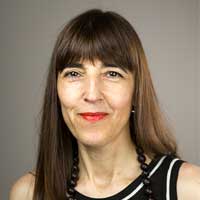 Mercedes Herrero de la Fuente
Profesora del Taller de documentales y reportajes y Trabajo fin de Máster
Special programs: Broadcast of major events professor and Final Research Project.
Doctora en Ciencias de la Información por la Universidad Complutense de Madrid y profesora acreditada para universidad pública y privada por la ACAP. Miembro del claustro permanente de la Universidad Nebrija desde 2015, donde ha dirigido el Máster en Periodismo Digital y de Datos (2016-2021) y el Máster en Periodismo en Televisión (2015-2019) y participado en el diseño académico de otros postgrados, como el Máster en Periodismo y Retransmisiones Deportivas. En esta universidad imparte clase en grado y postgrado. En asignaturas relacionadas con la producción televisiva, la realización de documentales y reportajes y la actualidad internacional. Ha sido docente en otras universidades, como la UCM y la Universidad Camilo José Cela, en especial en el área de postgrado. Ha desarrollado su labor investigadora en diferentes universidades extranjeras, como la Cornell University (EE.UU.), la University of Salford (Reino Unido), la Radboud Universiteit (Países Bajos) y la Univerzita Karlova (República Checa).
Mercedes Herrero de la Fuente
Profesora del Taller de documentales y reportajes y Trabajo fin de Máster
Special programs: Broadcast of major events professor and Final Research Project.
Doctora en Ciencias de la Información por la Universidad Complutense de Madrid y profesora acreditada para universidad pública y privada por la ACAP. Miembro del claustro permanente de la Universidad Nebrija desde 2015, donde ha dirigido el Máster en Periodismo Digital y de Datos (2016-2021) y el Máster en Periodismo en Televisión (2015-2019) y participado en el diseño académico de otros postgrados, como el Máster en Periodismo y Retransmisiones Deportivas. En esta universidad imparte clase en grado y postgrado. En asignaturas relacionadas con la producción televisiva, la realización de documentales y reportajes y la actualidad internacional. Ha sido docente en otras universidades, como la UCM y la Universidad Camilo José Cela, en especial en el área de postgrado. Ha desarrollado su labor investigadora en diferentes universidades extranjeras, como la Cornell University (EE.UU.), la University of Salford (Reino Unido), la Radboud Universiteit (Países Bajos) y la Univerzita Karlova (República Checa).
 Laila Jiménez Moreno
Profesora de Presentación y locución
Professor of Presentation and locution
Licenciada en Periodismo por la Universidad Autónoma de Barcelona. Comenzó su trayectoria profesional en CNN+ donde trabajó como redactora en Madrid y en la delegación de Barcelona de la cadena. Durante un año desempeñó su función en la redacción de Antena3 Noticias en Cataluña. En 2016 se incorporó al equipo de Informativos Telecinco para hacerse cargo de las conexiones en directo. Trabajó como reportera para todas las secciones y también para distintos programas (La Mirada Crítica) y ediciones especiales
realizados por la casa. Ha sido desplazada en calidad de enviada especial a coberturas como, por ejemplo, los atentados de Niza de 2016. Actualmente forma parte del equipo de presentadores de la edición matinal de Informativos Telecinco.
Laila Jiménez Moreno
Profesora de Presentación y locución
Professor of Presentation and locution
Licenciada en Periodismo por la Universidad Autónoma de Barcelona. Comenzó su trayectoria profesional en CNN+ donde trabajó como redactora en Madrid y en la delegación de Barcelona de la cadena. Durante un año desempeñó su función en la redacción de Antena3 Noticias en Cataluña. En 2016 se incorporó al equipo de Informativos Telecinco para hacerse cargo de las conexiones en directo. Trabajó como reportera para todas las secciones y también para distintos programas (La Mirada Crítica) y ediciones especiales
realizados por la casa. Ha sido desplazada en calidad de enviada especial a coberturas como, por ejemplo, los atentados de Niza de 2016. Actualmente forma parte del equipo de presentadores de la edición matinal de Informativos Telecinco.
 Wilfried Oehling Durán
Profesor de Periodismo Internacional
Professor of International Journalism
Licenciado en Periodismo por la Universidad de Navarra, realizó cursos de postgrado en la especialidad de Broadcast News en UCLA (Los Ángeles University, California) y es Master MBA de la Universidad de Salamanca/Santillana.
Ligado siempre a los programas informativos en televisión, comienza su carrera profesional en 1990 en Estados Unidos en la redacción de programas de Univisión en Los Ángeles y Telemundo/CNN. Posteriormente, cuando se lanzaron las cadenas privadas en España, se incorpora a la redacción de Informativos Telecinco, donde ha trabajado como redactor, editor y presentador de informativos.
Desde 1996 dirige la sección de Internacional y ha cubierto como enviado especial numerosos conflictos como el colapso de la Unión Soviética, la transferencia de soberanía de Hong Kong a China, la Guerra civil en Argelia, el conflicto de Irak, elecciones legislativas y presidenciales en Estados Unidos, Rusia, Reino Unido, Francia o Alemania, entre otros.
Como jefe de la sección de Internacional, los informativos de Telecinco recibieron el premio Ondas de Radio y Televisión por la cobertura de la Guerra de Kosovo y el TP de Oro por la cobertura de la Guerra de Afganistán.
Wilfried Oehling Durán
Profesor de Periodismo Internacional
Professor of International Journalism
Licenciado en Periodismo por la Universidad de Navarra, realizó cursos de postgrado en la especialidad de Broadcast News en UCLA (Los Ángeles University, California) y es Master MBA de la Universidad de Salamanca/Santillana.
Ligado siempre a los programas informativos en televisión, comienza su carrera profesional en 1990 en Estados Unidos en la redacción de programas de Univisión en Los Ángeles y Telemundo/CNN. Posteriormente, cuando se lanzaron las cadenas privadas en España, se incorpora a la redacción de Informativos Telecinco, donde ha trabajado como redactor, editor y presentador de informativos.
Desde 1996 dirige la sección de Internacional y ha cubierto como enviado especial numerosos conflictos como el colapso de la Unión Soviética, la transferencia de soberanía de Hong Kong a China, la Guerra civil en Argelia, el conflicto de Irak, elecciones legislativas y presidenciales en Estados Unidos, Rusia, Reino Unido, Francia o Alemania, entre otros.
Como jefe de la sección de Internacional, los informativos de Telecinco recibieron el premio Ondas de Radio y Televisión por la cobertura de la Guerra de Kosovo y el TP de Oro por la cobertura de la Guerra de Afganistán.
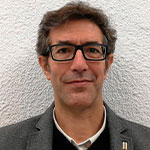 Alfonso Rafael Molina Caño
Profesor de Programas especiales: retransmisiones de grandes eventos
Professor of Special Programs: broadcasts of major events
Licenciado CC. de la Información (Complutense) y Master en Administración de la empresa informativa (Carlos III) En la actualidad es gerente de producción de Antena 3 Noticias.
Bajo su responsabilidad tiene la solicitud de medios técnicos para la producción de Noticias 15h., Noticias 21h., Espejo Público y Tu tiempo. Responsable de la producción y los presupuestos de programas especiales, además del intercambio de imágenes y archivos entre las delegaciones y la sede central de Antena 3 Noticias en Madrid. También es el encargado de la compra y venta de imágenes a proveedores externos, la negociación de precios especiales en circuitos de satélite para los programas de Deportes y Elecciones, además del control del gasto del presupuesto de A3 Noticias, Espejo público y Tu Tiempo y del control del servicio de Corresponsales, colaboradores y cámaras ENG.
En la universidad Nebrija ha impartido clase de postgrado en la asignatura Producción de grandes eventos desde el año 2011 hasta la actualidad.
Anteriormente fue productor de Escenografía, productor de deportes en los partidos de la Champions y de la Selección Española de fútbol. Productor del informativo Noticias 15 horas. Productor del Canal internacional. Enviado especial internacional los años 1998-2002.
Alfonso Rafael Molina Caño
Profesor de Programas especiales: retransmisiones de grandes eventos
Professor of Special Programs: broadcasts of major events
Licenciado CC. de la Información (Complutense) y Master en Administración de la empresa informativa (Carlos III) En la actualidad es gerente de producción de Antena 3 Noticias.
Bajo su responsabilidad tiene la solicitud de medios técnicos para la producción de Noticias 15h., Noticias 21h., Espejo Público y Tu tiempo. Responsable de la producción y los presupuestos de programas especiales, además del intercambio de imágenes y archivos entre las delegaciones y la sede central de Antena 3 Noticias en Madrid. También es el encargado de la compra y venta de imágenes a proveedores externos, la negociación de precios especiales en circuitos de satélite para los programas de Deportes y Elecciones, además del control del gasto del presupuesto de A3 Noticias, Espejo público y Tu Tiempo y del control del servicio de Corresponsales, colaboradores y cámaras ENG.
En la universidad Nebrija ha impartido clase de postgrado en la asignatura Producción de grandes eventos desde el año 2011 hasta la actualidad.
Anteriormente fue productor de Escenografía, productor de deportes en los partidos de la Champions y de la Selección Española de fútbol. Productor del informativo Noticias 15 horas. Productor del Canal internacional. Enviado especial internacional los años 1998-2002.
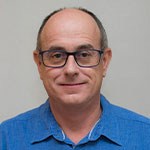 Jorge Mozas Ruiz
Profesor de Taller de tecnologías informativas
Professor of Information Technology Workshop
Licenciado en Ciencias de la Información (Imagen) por la Universidad Complutense de Madrid. Desde 1999 Media Manager en Antena 3 ayudando a los procesos de digitalización y puesta en marcha de sistemas en las redacciones. Actualmente trabaja como Técnico de Sistemas Multimedia (Media Manager) en Atresmedia en el departamento de Ingeniería. Formador interno en Atresmedia. Sistemas de producción digital (SPD) y Media Composer (AVID), Media Central Cloud UX e Inews. Cámara y mezclador de imagen en la AGENCIA EFE TV. Mezclador de imagen en Telemadrid, realizando programas informativos, Madrid Directo, Fútbol es fútbol, Sucedió en Madrid, eventos deportivos... Postproductor en la productora TYSDA.
Jorge Mozas Ruiz
Profesor de Taller de tecnologías informativas
Professor of Information Technology Workshop
Licenciado en Ciencias de la Información (Imagen) por la Universidad Complutense de Madrid. Desde 1999 Media Manager en Antena 3 ayudando a los procesos de digitalización y puesta en marcha de sistemas en las redacciones. Actualmente trabaja como Técnico de Sistemas Multimedia (Media Manager) en Atresmedia en el departamento de Ingeniería. Formador interno en Atresmedia. Sistemas de producción digital (SPD) y Media Composer (AVID), Media Central Cloud UX e Inews. Cámara y mezclador de imagen en la AGENCIA EFE TV. Mezclador de imagen en Telemadrid, realizando programas informativos, Madrid Directo, Fútbol es fútbol, Sucedió en Madrid, eventos deportivos... Postproductor en la productora TYSDA.
 Ángel Negro Rodríguez
Profesor de Taller de informativos: actualidad política
Professor of news workshop: political news
Licenciado en Periodismo por la Universidad Complutense de Madrid. (Premio Extraordinario Fin de Carrera), Máster en Periodismo en Televisión Antena 3 en la Universidad Antonio de Nebrija y Máster en Gestión de Empresas Audiovisuales de EAE Business School.
Tras pasar por La Crónica de León, Cadena Ser y RNE, actualmente desarrolla su actividad profesional en la sección de Nacional de Antena 3 Noticias, donde realiza crónicas, conexiones en directo y expertos en plató.
Como periodista, ha viajado a Francia o Suecia y ha cubierto, entre otros acontecimientos, numerosas jornadas electorales y congresos políticos.
Ángel Negro Rodríguez
Profesor de Taller de informativos: actualidad política
Professor of news workshop: political news
Licenciado en Periodismo por la Universidad Complutense de Madrid. (Premio Extraordinario Fin de Carrera), Máster en Periodismo en Televisión Antena 3 en la Universidad Antonio de Nebrija y Máster en Gestión de Empresas Audiovisuales de EAE Business School.
Tras pasar por La Crónica de León, Cadena Ser y RNE, actualmente desarrolla su actividad profesional en la sección de Nacional de Antena 3 Noticias, donde realiza crónicas, conexiones en directo y expertos en plató.
Como periodista, ha viajado a Francia o Suecia y ha cubierto, entre otros acontecimientos, numerosas jornadas electorales y congresos políticos.
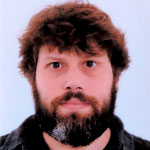 Alejandro Priego Díaz
Profesor de Taller Avanzado de edición y montaje digital
Professor of Advanced Workshop on digital editing and editing
Licenciado en Comunicación Audiovisual por la Universidad Rey Juan Carlos I.
Su experiencia docente incluye distintas asignaturas en la Universidad Nebrija, UTAD y en la Universidad Complutense y cursos de Certificación de Profesionalidad de la Comunidad de Madrid.
Su experiencia profesional se ha centrado en la realización, edición y postproducción de vídeo para distintas productoras y canales de televisión (Endemol Shine Iberia, Europroducciones, Tesseo, Plural Entertainment España, Bainet Media, Zebra Producciones, Globomedia, Mediapro, Trímboli, Antena 3, La Sexta, Canal +, Telemadrid, TVE, Canal Extremadura, MTV, Comedy Central y Telecinco), en programas como Lazos de Sangre, Las Mañanas de la 1, La Noche de Rober, Generación Nini, Dragolandia, Sex Mundi (Serie documental para El País y el canal Odisea), Desafío Ben 10 (Boing), Gourmetmanía, Ultra Mega Cool (Mtv), Yutubers, Madridistas por el Mundo (RMTV), Los Viernes al Show (Antena 3) o Mujeres y Hombres y Viceversa (Mediaset).
En la actualidad es editor y postproductor en Tesseo, realizando tanto programas de televisión como diversas campañas publicitarias.
Alejandro Priego Díaz
Profesor de Taller Avanzado de edición y montaje digital
Professor of Advanced Workshop on digital editing and editing
Licenciado en Comunicación Audiovisual por la Universidad Rey Juan Carlos I.
Su experiencia docente incluye distintas asignaturas en la Universidad Nebrija, UTAD y en la Universidad Complutense y cursos de Certificación de Profesionalidad de la Comunidad de Madrid.
Su experiencia profesional se ha centrado en la realización, edición y postproducción de vídeo para distintas productoras y canales de televisión (Endemol Shine Iberia, Europroducciones, Tesseo, Plural Entertainment España, Bainet Media, Zebra Producciones, Globomedia, Mediapro, Trímboli, Antena 3, La Sexta, Canal +, Telemadrid, TVE, Canal Extremadura, MTV, Comedy Central y Telecinco), en programas como Lazos de Sangre, Las Mañanas de la 1, La Noche de Rober, Generación Nini, Dragolandia, Sex Mundi (Serie documental para El País y el canal Odisea), Desafío Ben 10 (Boing), Gourmetmanía, Ultra Mega Cool (Mtv), Yutubers, Madridistas por el Mundo (RMTV), Los Viernes al Show (Antena 3) o Mujeres y Hombres y Viceversa (Mediaset).
En la actualidad es editor y postproductor en Tesseo, realizando tanto programas de televisión como diversas campañas publicitarias.
 Juana Rubio Romero
Profesora de Metodología de investigación en CC. de la Comunicación
Research Methodology in Communication Sciences professor
Profesora Doctora Acreditada por ANECA. Doctora en Filosofía. Licenciada en Psicología. Profesora e investigadora en la Facultad de Comunicación y Artes desde 1996. Su especialización son los Métodos de Investigación y la Psicología aplicados a la comunicación y al consumo. Experiencia profesional en investigación social y de mercado. Ha ejercido en diversos puestos de responsabilidad como investigadora cualitativista para Institutos de Investigación, Agencias de Publicidad y clientes directos. Ha dirigido durante cinco años el Curso de Investigación en Marketing, que organiza AEDEMO. Ha participado en numerosos congresos nacionales e internaciones, como ponente y formando parte del comité organizador. Sus publicaciones más relevantes son documentos técnicos de investigación social.
Juana Rubio Romero
Profesora de Metodología de investigación en CC. de la Comunicación
Research Methodology in Communication Sciences professor
Profesora Doctora Acreditada por ANECA. Doctora en Filosofía. Licenciada en Psicología. Profesora e investigadora en la Facultad de Comunicación y Artes desde 1996. Su especialización son los Métodos de Investigación y la Psicología aplicados a la comunicación y al consumo. Experiencia profesional en investigación social y de mercado. Ha ejercido en diversos puestos de responsabilidad como investigadora cualitativista para Institutos de Investigación, Agencias de Publicidad y clientes directos. Ha dirigido durante cinco años el Curso de Investigación en Marketing, que organiza AEDEMO. Ha participado en numerosos congresos nacionales e internaciones, como ponente y formando parte del comité organizador. Sus publicaciones más relevantes son documentos técnicos de investigación social.
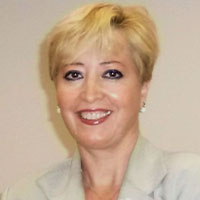 Beatriz Sanjurjo Rebollo
Profesora de Aplicaciones prácticas a la libertad de información
Practical applications to freedom of information professor
Doctora en Derecho por la Universidad Autónoma de Madrid. Abogada en ejercicio del Ilustre Colegio de Abogados de Madrid. Profesora Universitaria de Derecho acreditada por la ANECA.
Diploma de Especialización en Derecho Constitucional y Ciencias Políticas por el Centro de Estudios Políticos y Constitucionales.
Dirección de Personal y Recursos Humanos por la Escuela de Organización Industrial.
Dirección y Gestión Empresarial por la Universidad Politécnica de Madrid.
Experta en Comercio Internacional por la Universidad Autónoma de Madrid.
Autora de diversas publicaciones científicas y artículos relacionados con Derecho, Periodismo, y Nuevas Tecnologías. Académica correspondiente de la Real Academia de Jurisprudencia y Legislación
Beatriz Sanjurjo Rebollo
Profesora de Aplicaciones prácticas a la libertad de información
Practical applications to freedom of information professor
Doctora en Derecho por la Universidad Autónoma de Madrid. Abogada en ejercicio del Ilustre Colegio de Abogados de Madrid. Profesora Universitaria de Derecho acreditada por la ANECA.
Diploma de Especialización en Derecho Constitucional y Ciencias Políticas por el Centro de Estudios Políticos y Constitucionales.
Dirección de Personal y Recursos Humanos por la Escuela de Organización Industrial.
Dirección y Gestión Empresarial por la Universidad Politécnica de Madrid.
Experta en Comercio Internacional por la Universidad Autónoma de Madrid.
Autora de diversas publicaciones científicas y artículos relacionados con Derecho, Periodismo, y Nuevas Tecnologías. Académica correspondiente de la Real Academia de Jurisprudencia y Legislación
 Saida Santana Mahmut
Profesora de Lenguaje audiovisual
Audiovisual language professor
Doctora por la Universidad Rey Juan Carlos. Profesora Acreditada por ANECA. Licenciada en Ciencias de la Información por la Universidad Complutense de Madrid. Máster en Artes Escénicas por la URJC y Máster en Coaching Personal y Ejecutivo por la Universidad Camilo José Cela.
Saida Santana Mahmut
Profesora de Lenguaje audiovisual
Audiovisual language professor
Doctora por la Universidad Rey Juan Carlos. Profesora Acreditada por ANECA. Licenciada en Ciencias de la Información por la Universidad Complutense de Madrid. Máster en Artes Escénicas por la URJC y Máster en Coaching Personal y Ejecutivo por la Universidad Camilo José Cela. Su tesis doctoral versa sobre “El espacio dramático Estudio 1 en la edad de oro de TVE (1965-1969)”.
Becaria Erasmus en Salerno y Free Mover en Roma, con estudios en DAMS.
Ha trabajado en televisión, cine y teatro, como actriz, guionista, periodista, creadora escénica o coach. Como periodista y guionista ha trabajado para distintas productoras. Entre sus últimos trabajos destaca su coordinación de guion en el programa de Juan Ramón Lucas de TVE “En noches como ésta”. En su labor de guionista podemos mencionar sus trabajos para el Terrat (La Sexta), La Ardilla o Literal PC, en los que desarrolló programas de televisión de entretenimiento, concursos, vídeos corporativos y espacios de ficción. También trabajó en los programas concurso de TVE “Enrédate” y “A saco”.
En Estados Unidos ha escrito unitarios para Telemundo, ha sido dialoguista en varias series y ha colaborado con el escritor Andrés López.
En prensa escrita ha sido colaboradora fija de la Revista Pshycologies desde 2005, ha escrito contenidos de educación para Apréndelo.com y ha sido miembro del consejo editorial de la Revista Investigartes y Puente Atlántico del siglo XXI. Ha unido su labor de guionista televisivo con la de presentadora en el programa “Ida y vuelta”, con el que recorrió el mundo entrevistando a canarios célebres de las más variadas disciplinas. También presentó “40 años de TVE en Canarias”, entre otros. Actualmente es colaboradora fija de la Revista Azure y el periódico I am not your boring newspaper, de Miami. Como jefa de departamentos de comunicación destaca su campaña de comunicación y promoción del libro escrito por Kate McCann “Madeleine”. Su labor de gestión le ha llevado a dirigir la Sección “Nuevas Disciplinas” de la Cátedra Josefina de la Torre en el marco del Festival Internacional de cine de Las Palmas.
En Miami y Nueva York ha estrenado sus proyectos teatrales multimedia “Una Josefina del Siglo XXI” y “Dentro”. Como actriz (www.saidasantana.com) ha protagonizado obras de teatro, series de televisión y películas. Destaca su papel protagonista en la película de Rolando Díaz “La vida según Ofelia”, su rol secundario en la película de Mario Iglesias “De Bares”, su coprotagonista en la ficción de “Todos a cien”, o su participación en la serie “El juramento de Punta Brava”. En EEUU fue actriz secundaria en la serie “Cosita Linda”, de Venevisión Internacional.
 Vicente Sanz De León
Profesor de Taller avanzado de manejo de cámara
Professor of Advanced Camera Management Workshop
Doctor en Comunicación Audiovisual y Publicidad. Licenciado en Ciencias de la Información y Master en Tecnologías Audiovisuales Interactivas por la UCM. Profesor de la Titulación de Comunicación Audiovisual de la UCM desde 2005. Ha sido profesor del Master TDI de la UCM y profesor del Curso de Producción Profesional de TV y Vídeo Digital de la Fundación General de la UCM y profesor de la titulación de Técnico Superior.
Investigación en Comunicación Audiovisual especializada en la Formación y las Nuevas Tecnologías.
Operador de Cámara free lance y desarrollo, dirección y postproducción de diversas creaciones multimedia y audiovisuales.
Vicente Sanz De León
Profesor de Taller avanzado de manejo de cámara
Professor of Advanced Camera Management Workshop
Doctor en Comunicación Audiovisual y Publicidad. Licenciado en Ciencias de la Información y Master en Tecnologías Audiovisuales Interactivas por la UCM. Profesor de la Titulación de Comunicación Audiovisual de la UCM desde 2005. Ha sido profesor del Master TDI de la UCM y profesor del Curso de Producción Profesional de TV y Vídeo Digital de la Fundación General de la UCM y profesor de la titulación de Técnico Superior.
Investigación en Comunicación Audiovisual especializada en la Formación y las Nuevas Tecnologías.
Operador de Cámara free lance y desarrollo, dirección y postproducción de diversas creaciones multimedia y audiovisuales.
 Francisco Suárez Rodriguez
Profesor de Producción, dirección y edición de programas informativos
Production, direction and edition of information programs professor
Doctor en Comunicación. Licenciado en Periodismo por la Universidad Complutense de Madrid.
Profesional de los medios de comunicación desde 1986. Fue miembro del equipo de deportes de Antena 3 Radio, dirigido por José María García. En televisión, tras un breve paso por Telecinco, se incorporó en 1998 a los Servicios Informativos de Antena 3, donde trabaja en la actualidad como redactor del informativo matinal. Formó parte de la primera redacción de deportes del diario El Mundo, colaboró con varios periódicos asturianos y fue corresponsal en Madrid del diario deportivo catalán Sport. Ha trabajado en el gabinete de prensa del Real Madrid C.F., en el del grupo automovilístico Volkswagen y ha sido Director de Comunicación del equipo ciclista CLAS-MAPEI.
Francisco Suárez Rodriguez
Profesor de Producción, dirección y edición de programas informativos
Production, direction and edition of information programs professor
Doctor en Comunicación. Licenciado en Periodismo por la Universidad Complutense de Madrid.
Profesional de los medios de comunicación desde 1986. Fue miembro del equipo de deportes de Antena 3 Radio, dirigido por José María García. En televisión, tras un breve paso por Telecinco, se incorporó en 1998 a los Servicios Informativos de Antena 3, donde trabaja en la actualidad como redactor del informativo matinal. Formó parte de la primera redacción de deportes del diario El Mundo, colaboró con varios periódicos asturianos y fue corresponsal en Madrid del diario deportivo catalán Sport. Ha trabajado en el gabinete de prensa del Real Madrid C.F., en el del grupo automovilístico Volkswagen y ha sido Director de Comunicación del equipo ciclista CLAS-MAPEI.
 Alfonso Torán Molano
Profesor de Periodismo económico
Professor of Economic Journalism
Licenciado en Periodismo con diploma de Especialización en TV y Radio por la Universidad Nebrija.
Tras pasar por La Gaceta de los Negocios, su carrera quedó ligada a los informativos de TV: ‘Telediario’ (TVE), ‘Informativos Telecinco’, ‘La Mirada Crítica’ de Vicente Vallés y Euronews (Francia), hasta que en 2006 se incorporó al equipo fundacional de La Sexta Noticias, donde actualmente es editor del programa ‘laSexta Columna’.
Ha realizado coberturas en Kosovo, Venezuela, México, Catar, Etiopía, Senegal, Francia y EE. UU. Ha sido subjefe de la sección Internacional, coeditor del magazine ‘Más Vale Tarde’, editor adjunto de informativos y editor de ‘La Sexta Noticias 14h’ entre 2012 y 2015, periodo en el que la redacción obtuvo de manera continuada el Premio Iris al Mejor Informativo por la Academia de TV.
Ha recibido formación en la Academia Nacional de Economía y Administración Pública de Moscú (RANEPA) y cursos sobre inversión y finanzas en la Bolsa de Madrid y otras entidades financieras. En la Universidad Nebrija, ha sido jurado del premio Nipho para la categoría de TV, tutor de TFM en el Máster en Periodismo en Televisión y ha participado en distintas sesiones formativas con alumnos de Grado, Máster y programas internacionales.
Alfonso Torán Molano
Profesor de Periodismo económico
Professor of Economic Journalism
Licenciado en Periodismo con diploma de Especialización en TV y Radio por la Universidad Nebrija.
Tras pasar por La Gaceta de los Negocios, su carrera quedó ligada a los informativos de TV: ‘Telediario’ (TVE), ‘Informativos Telecinco’, ‘La Mirada Crítica’ de Vicente Vallés y Euronews (Francia), hasta que en 2006 se incorporó al equipo fundacional de La Sexta Noticias, donde actualmente es editor del programa ‘laSexta Columna’.
Ha realizado coberturas en Kosovo, Venezuela, México, Catar, Etiopía, Senegal, Francia y EE. UU. Ha sido subjefe de la sección Internacional, coeditor del magazine ‘Más Vale Tarde’, editor adjunto de informativos y editor de ‘La Sexta Noticias 14h’ entre 2012 y 2015, periodo en el que la redacción obtuvo de manera continuada el Premio Iris al Mejor Informativo por la Academia de TV.
Ha recibido formación en la Academia Nacional de Economía y Administración Pública de Moscú (RANEPA) y cursos sobre inversión y finanzas en la Bolsa de Madrid y otras entidades financieras. En la Universidad Nebrija, ha sido jurado del premio Nipho para la categoría de TV, tutor de TFM en el Máster en Periodismo en Televisión y ha participado en distintas sesiones formativas con alumnos de Grado, Máster y programas internacionales.
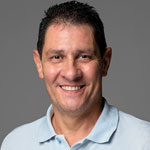 Antonio Vaquerizo Mariscal
Profesor de Periodismo deportivo
Sports journalism professor
Doctor en Ciencias de la Información por la UCM (departamento de Historia de la Comunicación Social). Periodista con 30 años de experiencia; ha desarrollado su labor profesional entre otros medios en: Antena 3 Televisión, Telemadrid, Intereconomía y Movistar Plus, entre otros.
Antonio Vaquerizo Mariscal
Profesor de Periodismo deportivo
Sports journalism professor
Doctor en Ciencias de la Información por la UCM (departamento de Historia de la Comunicación Social). Periodista con 30 años de experiencia; ha desarrollado su labor profesional entre otros medios en: Antena 3 Televisión, Telemadrid, Intereconomía y Movistar Plus, entre otros.
More Academic Information
Official Degree:Master's Degree in Journalism in TV
The University Master's Degree in Journalism in Television is aimed at those who want to develop a career as journalists specialized in television, planning and making audiovisual news. To be admitted to the program, it is necessary to be in possession of a higher university degree such as undergraduate, bachelor, higher engineering, or equivalent. Our students come from undergraduate degrees in Journalism (70%), Audiovisual Communication, Advertising and Public Relations, Business Administration and Management and Sociology, among others.
Our students are perfectly prepared to work in the different profiles demanded by television information companies. They are journalists trained in the areas of production, direction, filming, editing, reporting and presentation before the camera.
60 ECTS credits.
Minimum 12 ECTS and maximum 60 ECTS per registration and academic period
Center responsible:School of Communication and Arts
Branch of knowledge: Social and Legal Sciences
Available places: 40
Type of Education: Classroom attendance
Academic year in which it was implemented: 2010-2011
Languages: Spanish
Duration: 1 year. From October to June
University Services: [+info]
Skills
Specific Skills- Advanced knowledge of the application of techniques and processes of production and broadcasting in television, in its various phases, from the point of view of the organization and management of technical, human and budgetary resources.
- Delving into the ability to express oneself fluently and communicatively in the Spanish language, orally and in writing, with mastery of the linguistic and literary resources most suited to the television medium.
- Proficiency in the ability to summarize texts and specialized documents on relevant topics, through the use of a journalistic language adapted to the Television Medium.
- Ability for the advanced use of techniques and processes in the various phases of the construction of multimedia production and interactive materials.
- Deep knowledge of the existing organizational structures in the field of communication and nature and interrelations between the subjects of communication.
- Deep knowledge of professional ethics and deontology as well as advanced knowledge of the legal system of information in what affects the professional practice of the journalist.
- Mastery of the different mechanisms and elements of the construction of news, reports and documentaries on television, according to different formats, technologies and production supports.
- Deep knowledge of the applications and technological resources available to create, build and analyze audiovisual products. It includes the design and development of strategies for a truthful communication.
- Advanced knowledge at the user level of the technologies applied to audiovisual media (photography, sound, video, film and multimedia).
- Deep knowledge of the social and professional environment to adapt to the technological and business changes of the sector.
- Mastery of the journalistic style in television, in aspects related to its structure, genres, techniques, sources and conditions that characterize the information, interpretation and opinion about events in this specific medium.
- Specialized knowledge of obtaining current information, its assessment and selection, the interpretation of known facts and their subsequent treatment
- Advanced capabilities and skills at user level of computer systems and resources and their interactive applications in the Medium Television and multimedia environments.
- Possess and understand fundamental knowledge that is framed in a multidisciplinary context characterized by the conjunction of Communication and Arts, Social, Economic and Business Sciences and International Relations, among others.
- Be able to integrate knowledge and face the complexity of making judgments based on information that, being incomplete or limited, includes reflections on political, social, economic and ethical aspects.
- Know how to apply the knowledge acquired and have developed a great capacity to solve problems and make decisions related to the search of news in unfamiliar environments, in conditions of limited time and high pressure in order to achieve results.
- Know how to apply the knowledge acquired and have developed a great capacity to solve problems and make decision-making related to the news media treatment in the medium-term television in conditions of limited time and high pressure to achieve results.
- Know how to communicate their conclusions and the knowledge and ultimate reasons that support them to specialized and non-specialized audiences in a clear, attractive way and adapted to the specific characteristics of Television.
- Know how to apply the acquired knowledge and develop a great capacity to develop their professional and academic work in media and social environments that are undergoing constant evolution, driven by the advancement and dissemination of new information and communication technologies.
- Have a great capacity for teamwork and adequately master diversity management.
- Develop a great sensitivity in the development of their professional and/or academic work, in compliance with current regulations at both the Spanish and European level, the codes of good practice, the criteria of self-control, the promotion of equality of women, disabled people, the protection of children and, in general, the principles contained in the Spanish Constitution and the values of the Culture of Peace.
- Possess the learning skills that allow them to continue studying in a way that will be largely self-directed or autonomous, in order to remain up to the challenges posed by a world that is constantly evolving.
- Possess the learning skills that allow them to start an academic career in the area of knowledge of Communication and Arts, after having developed a professional career of journalists for a few years, if that was their wish.
Calendar and Schedules
Access and Admission
It is an essential requirement to access the Master's programs to have a Bachelor's degree or equivalent in accordance with the current legislation. A Bachelor's Degree in Communication Sciences (Journalism, Audiovisual Communication, Advertising and Public Relations) will be especially valued. In this sense, we are looking for students who have skills that foresee a good disposition for teamwork, have great flexibility and open-mindedness to the incorporation of new knowledge and new ways of working, and that, regardless of what scientific or technical studies they come from, they show a great interest in the humanities in general, and a great sense of social responsibility in professional work.
The admission process to the Master's degree begins by sending the following documentation by post or courier to the Postgraduate Admissions Section:
- Completed Admission Application.
- Updated Curriculum Vitae.
- Photocopy of DNI (only Spanish candidates) or passport (only foreign candidates).
- Photocopy of the Academic transcript/record (completed studies or in the last year of the university degree).
- Two color, passport-size photographs.
Once the documentation has been received and it has been verified that the diploma submitted grants to the degree, as established in Arts. 15 and 16 of Royal Decree 1393/2007, candidates take the admission test with the coordinator of the degree. This test is carried out in person in Madrid when possible or, failing that, it can also be taken remotely (online) for those candidates residing outside of Spain.
The candidate holds a personal interview with the Program Coordinator. This interview is in itself an admission test in which the specific knowledge of the candidate is evaluated through a battery of questions about the area of knowledge, as well as their level of maturity and attitudes to it. After this interview, the coordinator prepares a report on the candidate's skills profile, his degree of maturity, his personal interest in Audiovisual Journalism and his suitability for the degree, which is attached to the file that the Admissions Commission will assess.
The University Admissions Commission, made up of heads of the Department itself, the General Secretary and the Department of University Development will be in charge of proposing to the Rector of the University the granting of student status to those candidates whose suitability has been proven.
The candidate receives written information about their admission, which is previously provided by phone, about the result of the admission process and formalizing their enrollment in the Program, the definitive documentation, duly legalized, that must be submitted, etc.
Employability
Career Opportunities
The teaching staff of the School of Communication and Arts is made up of professionals from each field of specialization, who develop a teaching method based on the conviction that what we learn, we learn by doing it.
Integration with the profession is based on the incorporation of professionals as associate professors supporting each program, in a teaching methodology inspired by the learning by doing proposal that involves the experiential aspect in the classrooms and in academic extension activities.
The Master's Degree in Journalism in Television has close ties with numerous companies and media from all fields, a notable characteristic that is enriches by both the teaching staff and the internship program.
The Master's Degree in Journalism in Television trains professionals whose future work will be:
Internships
Nebrija University has signed a Collaboration Agreement on training and employment internships with nearly 3,000 companies and institutions, to promote the practical training of all its students and the approach to the professional environment and first job of university graduates.
These are some of the companies that can be chosen by the students of the Master's Degree in Journalism in Television, in order to carry out their internships and enter fully into contact with the professional field, related to television journalism:
- Antena 3 Multimedia
- Antena 3 Noticias
- Asociación de la prensa de Madrid (APM)
- Boomerang TV
- Cuarzo Producciones
- Europa Press Comunicación
- Ente Público de Radio Televisión de Castilla La Mancha
- Fundación Atresmedia
- Fox International Channels España
- Gestora de Inversiones Audiovisuales La Sexta S.A
- Globomedia
- IDG Communications
- La Escuadra Invencible
- La Máquina Total Sports
- Liquid Media S.L
- Medianews Producción de Noticias
- Mediaset España Comunicación
- Mediatem Canales Temáticos
- Molinare
- Periodista Digital
- Sociedad Pública de Radiodifusión y Televisión Extremeña
- Thomson Reuters Markets España
- Unidad Editorial
- Unipresx TV
- VNews Agencia de Noticias
- Vozpópuli Digital
Activities in Journalism in Television
XIV Edición Premios NIPHO
The Faculty of Communication and Arts of the Nebrija University celebrates the NIPHO contest again, in this case, its 14th edition, which rewards the best journalistic works of the students in different categories: written press, television, radio, photography... In addition, it recognizes the trajectory of great professionals.
XIII Edición Premios NIPHO
Once again, the School of Communication and Arts of the Nebrija University celebrates the NIPHO contest, in this case, its 12 + 1 edition, which awards the students' best journalistic works in different categories: written press, television, radio, photography... In addition, it recognizes the career path of two great professionals. On this occasion, the winners will be Mercedes Milá and Eva Tribiño.
Jon Sistiaga in the conference “Nebrija Journalists”
Journalist Jon Sistiaga has starred in the second session of the conference 'Nebrija Journalists' organized by Nebrija University's School of Communication Sciences.

CLABE, the future of media under debate
Nebrija University hosted the conference on the future of media, organized by CLABE (Club Abierto de Editores), which addressed topics of interest such as fake news, disinformation and the application of artificial intelligence in Journalism. [Read more]

Fake news and social networks in the teaching field
Fake news is one of the greatest challenges facing humanity in our time of information overload. Laura Martínez Otón, director of the Master's Degree in Radio, Podcast and Digital Audio – Cadena SER, addresses this topic, which is as interesting as it is necessary, in her latest book, presented at Nebrija University. [Read more]

